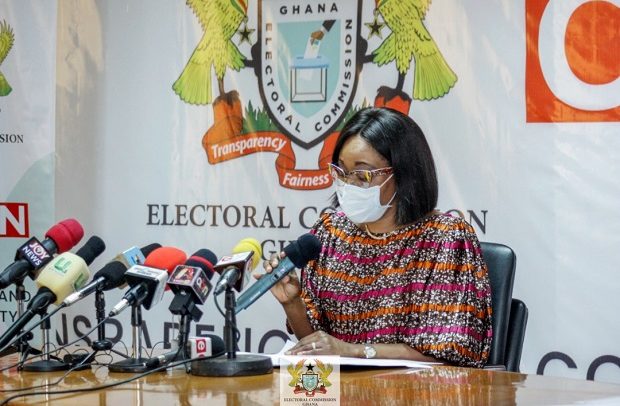Jean Mensa
Chairperson of the Electoral Commission (EC), Jean Mensa, has disclosed that the commission expects to register between 450,000 and 550,000 Ghanaians annually based on the results of the 2021 census.
“We believe that of the 17 million people registered by the NIA, 450,000 to 550,000 of the 450,000 to 550,000 people we intend to register annually have the card as we speak,” she said on Tuesday while briefing Parliament on the draft Public Elections (Registration of Voters) Regulations 2023.
She said the commission was reliably informed that over 17 million Ghanaians have registered for the card and that about 16 million Ghana cards have been issued.
“On the strength of these numbers, we are convinced that the 1.5 million applicants we are expecting to register by the end of 2023, following the last registration exercise in 2020, are likely to already possess the Ghana Card,” she told MPs.
“Mr. Speaker, with the NIA assurance that it will commence its card issuance in a matter of weeks, we encourage those who do not have the card to begin the process of acquiring the card to enable them register as voters.
“The NIA has its registration centres across the districts and the regional capitals. Therefore, accessing their facilities will not be a challenge,” she added.
She encouraged Ghanaians who will turn 18 in 2023 and 2024 and interested in voting in the country’s elections to visit the nearest NIA registration centre and register for the Ghana card to enable him/her to also register as a voter when he/she becomes eligible.
“It is important to note that all those who registered in 2020 are not part of this registration exercise because all their details including their biometrics (fingerprints and facial features) are intact.
“This registration is for those who did not take part in the 2020 voters registration exercise and those who have turned 18 years since the last voter’s registration exercise in 2020,” she stated.
Reforms
Mrs. Mensa said as an institution, the Electoral Commission remains committed to reforms aimed at strengthening the integrity of its processes.
“We believe that the elimination of the guarantor system from our registration process will be a catalyst for further deepening the integrity and credibility of our register and ultimately our elections, as a whole,” she argued.
For her, the reforms instituted by the EC over the years have aimed at strengthening and tightening the country’s electoral process and ensuring its credibility and integrity.
“For example, in 2012 we replaced our manual Voters Register with a Biometric Register. This engendered confidence and trust in our Register. Ahead of Elections 2020, we introduced the facial recognition function, in addition to the fingerprint verification. This ensured that over 99.9% of voters were electronically verified,” the EC boss said.
She stated further that similarly, the adoption of the transparent ballot boxes instead of the opaque ballot boxes, the issuance of photo identity cards instead of thumb printed ID cards and the removal of the names of those who enrolled in the register using the National Health Insurance card are all part of the reforms which have tightened and strengthened the processes and ensured the credibility of the elections.
“Indeed, the integrity, credibility and transparency of our reform electoral process is at par with that of the most advanced democracies anywhere in the world,” she said.
EC boss asserted that it is in this vein that the commission is calling on MPs to support its decision to rely on the Ghana Card as the main source of identification for those who wish to register as voters.
“Our country has evolved, and it is important that our electoral processes also evolve to meet the exigencies of the times. Let me state again that, in 1992 when we had no ID card we adopted the guarantor system.
“Today, 30 years on, we cannot continue to use a system that is fraught with challenges and more so when we now have a credible system National Identification Card in place,” she noted.
She emphasised once again that the registration exercise, unlike the previous limited registration exercise, will be continuous.
“As such anyone who has a Ghana Card can simply visit any of our offices and get registered. The exercise is not a periodic or limited one that could lead to disenfranchising persons who do not possess the Ghana Card. This is an all year-round activity.
“As such, a person who does not have the Ghana Card today can acquire it tomorrow and simply walk into a district office where he or she intends to vote and register,” she posited.
Officials of the National Identification Authority, led by its Executive Secretary, Prof. Ken Attafuah, also briefed the House on the registrants on the authority’s roll.
By Ernest Kofi Adu, Parliament House


